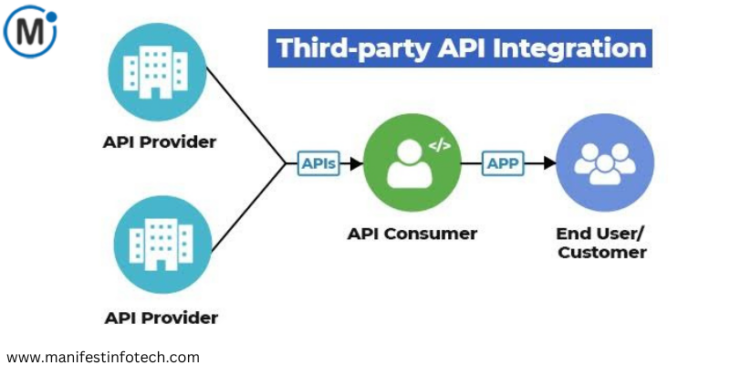
In today’s digital age, third-party services have become an integral part of modern application development. By integrating services such as payment gateways and analytics platforms, businesses can enhance functionality, improve user experiences, and streamline operations. This blog explores the importance of third-party integrations, the steps involved, and best practices for incorporating these services into your applications seamlessly.
Why Integrate Third-Party Services?
Third-party services offer specialized functionality that would otherwise require significant development time and expertise to implement in-house. Here are some key benefits:
Enhanced Functionality: Payment gateways like Stripe or PayPal provide secure transaction processing, while analytics platforms like Google Analytics or Mixpanel offer deep insights into user behavior.
Time Efficiency: By using pre-built solutions, developers can focus on core application features instead of reinventing the wheel.
Scalability and Reliability: Established third-party services are built to handle large-scale operations, ensuring smooth performance even under high demand.
Payment Gateway Integration
Payment gateways are essential for e-commerce platforms, SaaS applications, and any system requiring monetary transactions. Popular payment gateways include Stripe, PayPal, Razorpay, and Square. Here’s how to integrate them:
Choose the Right Gateway:
Consider factors such as transaction fees, supported currencies, and geographical availability.
Evaluate security features like PCI compliance and fraud detection.
Get API Credentials:
Sign up for a developer account on the payment gateway’s platform.
Obtain API keys or tokens, which will be used to authenticate your application.
Implement the API:
Use the SDKs or APIs provided by the gateway to integrate payment functionality into your application.
For example, with Stripe, you can use their REST API to create payment intents and handle transactions securely.
Test Thoroughly:
Use sandbox environments to simulate transactions and ensure proper handling of success and failure scenarios.
Verify edge cases, such as declined cards or network failures.
Ensure Security:
Use HTTPS for all communication between your application and the payment gateway.
Never store sensitive payment information directly in your application; rely on the gateway for secure storage.
Analytics Integration
Analytics tools are vital for understanding user behavior, tracking performance, and optimizing business strategies. Popular platforms include Google Analytics, Mixpanel, and Hotjar. Here’s how to integrate analytics into your application:
Select the Right Tool:
Choose an analytics platform that aligns with your business goals. For example, Google Analytics is great for traffic monitoring, while Mixpanel excels in event tracking.
Add the Tracking Code:
Insert the tracking script or SDK provided by the analytics platform into your application. This is often done by placing a snippet in the header or body of your HTML.
Configure Events and Goals:
Define key events to track, such as button clicks, page views, or purchases.
Set up conversion goals to measure the success of specific actions, like form submissions or checkout completions.
Monitor and Analyze Data:
Use the platform’s dashboard to analyze user behavior and gather insights.
Leverage this data to make data-driven decisions and improve your application.
Best Practices for Integration
Read Documentation: Thoroughly understand the third-party service’s API or SDK by reading their documentation.
Handle Errors Gracefully: Ensure your application can handle API errors, such as rate limits or timeouts, without crashing.
Stay Updated: Keep track of changes to the third-party service’s API and update your implementation as needed.
Prioritize Security: Use secure credentials storage and follow best practices for API authentication.
Test Extensively: Test integrations under various scenarios, including network failures and high traffic.
Conclusion
Integrating third-party services like payment gateways and analytics tools empowers businesses to deliver enhanced functionality and gain valuable insights. By leveraging these solutions, you can save time, ensure reliability, and focus on your core objectives. Whether you’re processing payments or analyzing user data, a well-executed integration strategy can significantly elevate your application’s performance and user experience.
If you are looking for any services related to Website Development, App Development, Digital Marketing and SEO, just email us at nchouksey@manifestinfotech.com or Skype id: live:76bad32bff24d30d
𝐅𝐨𝐥𝐥𝐨𝐰 𝐔𝐬:
𝐋𝐢𝐧𝐤𝐞𝐝𝐢𝐧: linkedin.com/company/manifestinfotech
𝐅𝐚𝐜𝐞𝐛𝐨𝐨𝐤: facebook.com/manifestinfotech/
𝐈𝐧𝐬𝐭𝐚𝐠𝐫𝐚𝐦: instagram.com/manifestinfotech/
𝐓𝐰𝐢𝐭𝐭𝐞𝐫: twitter.com/Manifest_info
#Laravel #LaravelFramework #PHPFramework #WebDevelopment #PHP #CodeIgniter #Symfony #Programming #WebApp #WebDesign #FullStack #Backend #PHPDeveloper #SoftwareDevelopment #TechCommunity #OpenSource #PHPCode #LaravelCommunity #LaravelLove #LaravelLife #LaravelNation #LaravelTips #LaravelTricks #LaravelTutorial #LaravelProjects #LaravelCode #LaravelDev #LaravelCommunityLove #LaravelDevelopment #LaravelBestPractices